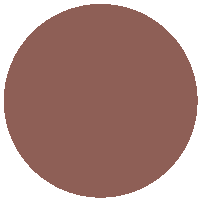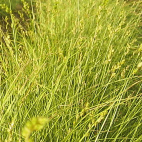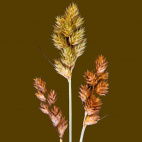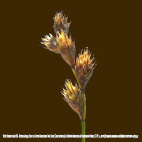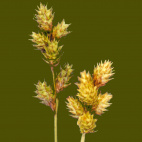Color
Availability
USDA Zone
Region
Type
Duration
Season
Germination
Soil
Sunlight
Height
Narrow Your Search
Color
Availability
USDA Zone
Region
Type
Duration
Season
Germination
Soil
Sunlight
Height
US Native Sedge Seeds
These Sedge grass seeds are an interesting bunch. Most of these come from the genus of Carex and most are cool season type grasses. A lot of sedges are at home in a wetland habitat, but there are some that tolerate mesic soils as well. There are actually hundreds of the Carex family in existence, so this is just a sampling of the unique species to be found in this family. Sedge grasses are almost impossible to identify by their leaves, but identification becomes more apparent when the seed heads appear because they are so unique.
-
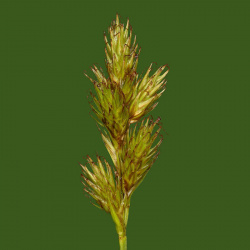 Awl fruited Oval Sedge Seeds
Carex tribuloides
Growing in the cool season, the awl fruited sedge bears a close resemblance to other members of the Sedge family. This perennial forms seeds early in the season and drops its seeds in the summer.Quick Viewx
Awl fruited Oval Sedge Seeds
Carex tribuloides
Growing in the cool season, the awl fruited sedge bears a close resemblance to other members of the Sedge family. This perennial forms seeds early in the season and drops its seeds in the summer.Quick ViewxAwl fruited Oval Sedge Seeds
Carex tribuloides
Growing in the cool season, the awl fruited sedge bears a close resemblance to other members of the Sedge family. This perennial forms seeds early in the season and drops its seeds in the summer.
$3.25 Pkt - $20.59 / Oz -
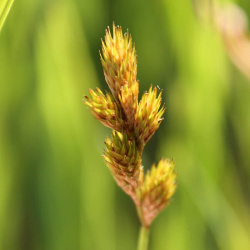 Bebb's Oval Sedge Seeds
Carex bebbii
Because it thrives in marshy and wet areas, this attractive sedge has become a crucial plant for wetland restoration. This cool-season native perennial needs a lot of sunlight and bears distinct, bristly seed heads, which the birds find attractive.Quick View$3.48 Pkt - $58.00 / Oz
Bebb's Oval Sedge Seeds
Carex bebbii
Because it thrives in marshy and wet areas, this attractive sedge has become a crucial plant for wetland restoration. This cool-season native perennial needs a lot of sunlight and bears distinct, bristly seed heads, which the birds find attractive.Quick View$3.48 Pkt - $58.00 / Oz -
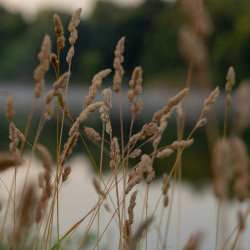 On Sale!
Brown Fox Sedge Seeds
Carex vulpinoidea
With seedheads resembling bushy fox tails, this native sedge is one of the most common members of the Sedge family. It is highly adaptable to either sun or shade and is often seen growing over large marshy areas.Quick Viewx
On Sale!
Brown Fox Sedge Seeds
Carex vulpinoidea
With seedheads resembling bushy fox tails, this native sedge is one of the most common members of the Sedge family. It is highly adaptable to either sun or shade and is often seen growing over large marshy areas.Quick ViewxBrown Fox Sedge Seeds
Carex vulpinoidea
With seedheads resembling bushy fox tails, this native sedge is one of the most common members of the Sedge family. It is highly adaptable to either sun or shade and is often seen growing over large marshy areas.
$3.25 Pkt - $11.03 / Oz -
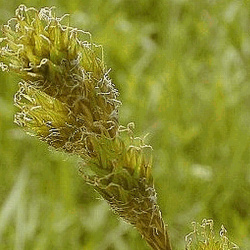 Copper Shouldered Oval Sedge Seeds
Carex bicknellii
This native sedge has narrow leaves that taper off about a foot below the green seed heads. Like most sedges, this is a cool-season perennial, and so forms seeds early in the season, and drops its seeds in the summer. It adapts to both prairies and marshes.Quick Viewx
Copper Shouldered Oval Sedge Seeds
Carex bicknellii
This native sedge has narrow leaves that taper off about a foot below the green seed heads. Like most sedges, this is a cool-season perennial, and so forms seeds early in the season, and drops its seeds in the summer. It adapts to both prairies and marshes.Quick ViewxCopper Shouldered Oval Sedge Seeds
Carex bicknellii
This native sedge has narrow leaves that taper off about a foot below the green seed heads. Like most sedges, this is a cool-season perennial, and so forms seeds early in the season, and drops its seeds in the summer. It adapts to both prairies and marshes.
$3.96 Pkt - $30.00 / Oz -
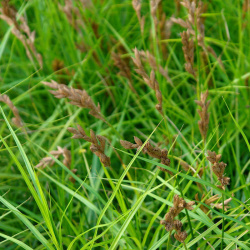 On Sale!
Oval Sedge Seeds
Carex scoparia
Also called Broom Sedge, this native sedge forms bristly seed heads. This wetland plant is often used for rain gardens and wetland restoration. This sedge is a cool-season perennial, and so forms seeds early in the season, and drops its seeds in the summer.Quick View$3.25 Pkt - $16.57 / Oz
On Sale!
Oval Sedge Seeds
Carex scoparia
Also called Broom Sedge, this native sedge forms bristly seed heads. This wetland plant is often used for rain gardens and wetland restoration. This sedge is a cool-season perennial, and so forms seeds early in the season, and drops its seeds in the summer.Quick View$3.25 Pkt - $16.57 / Oz -
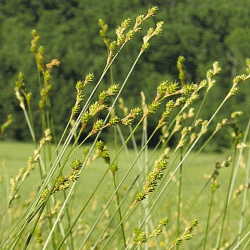 On Sale!
Plains Oval Sedge Seeds
Carex brevior
This highly adaptable sedge grows tufted bristly seed heads that form during the spring and mature in the summer. This native perennial does well in dry soils but can adapt to wet areas as well, so it is used in a wide variety of native seed mixes.Quick View$3.48 Pkt - $14.49 / Oz
On Sale!
Plains Oval Sedge Seeds
Carex brevior
This highly adaptable sedge grows tufted bristly seed heads that form during the spring and mature in the summer. This native perennial does well in dry soils but can adapt to wet areas as well, so it is used in a wide variety of native seed mixes.Quick View$3.48 Pkt - $14.49 / Oz
These Sedge grass seeds are an interesting bunch. Most of these come from the genus of Carex and most are cool season type grasses. A lot of sedges are at home in a wetland habitat, but there are some that tolerate mesic soils as well. There are actually hundreds of the Carex family in existence, so this is just a sampling of the unique species to be found in this family. Sedge grasses are almost impossible to identify by their leaves, but identification becomes more apparent when the seed heads appear because they are so unique.
